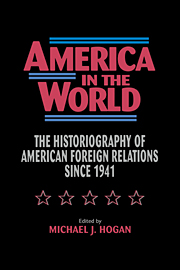Book contents
- Frontmatter
- Contents
- Preface
- The Authors
- Part One The State of the Art
- Part Two The Historiography of American Foreign Relations since 1941
- 6 The Historiography of American Foreign Relations: An Introduction
- 7 A Half-Century of Conflict: Interpretations of U.S. World War II Diplomacy
- 8 The Decision to Use the Bomb: A Historiographical Update
- 9 Origins of the Cold War in Europe and the Near East: Recent Historiography and the National Security Imperative
- 10 Making Known the Unknown War: Policy Analysis of the Korean Conflict since the Early 1980s
- 11 Eisenhower Revisionism: The Scholarly Debate
- 12 John F. Kennedy as World Leader: A Perspective on the Literature
- 13 The Unending Debate: Historians and the Vietnam War
- 14 Complaints, Self-Justifications, and Analysis: The Historiography of American Foreign Relations since 1969
- 15 An Emerging Synthesis? U.S.–Latin American Relations since the Second World War
- 16 Gideon's Band: America and the Middle East since 1945
- 17 The Cold War in Asia: The Elusive Synthesis
- 18 The Power of Money: The Historiography of American Economic Diplomacy
- 19 Coming in from the Cold War: The Historiography of American Intelligence, 1945–1990
- Index
11 - Eisenhower Revisionism: The Scholarly Debate
Published online by Cambridge University Press: 05 June 2012
- Frontmatter
- Contents
- Preface
- The Authors
- Part One The State of the Art
- Part Two The Historiography of American Foreign Relations since 1941
- 6 The Historiography of American Foreign Relations: An Introduction
- 7 A Half-Century of Conflict: Interpretations of U.S. World War II Diplomacy
- 8 The Decision to Use the Bomb: A Historiographical Update
- 9 Origins of the Cold War in Europe and the Near East: Recent Historiography and the National Security Imperative
- 10 Making Known the Unknown War: Policy Analysis of the Korean Conflict since the Early 1980s
- 11 Eisenhower Revisionism: The Scholarly Debate
- 12 John F. Kennedy as World Leader: A Perspective on the Literature
- 13 The Unending Debate: Historians and the Vietnam War
- 14 Complaints, Self-Justifications, and Analysis: The Historiography of American Foreign Relations since 1969
- 15 An Emerging Synthesis? U.S.–Latin American Relations since the Second World War
- 16 Gideon's Band: America and the Middle East since 1945
- 17 The Cold War in Asia: The Elusive Synthesis
- 18 The Power of Money: The Historiography of American Economic Diplomacy
- 19 Coming in from the Cold War: The Historiography of American Intelligence, 1945–1990
- Index
Summary
For historians of U.S. foreign relations, the 1980s and early 1990s were the Eisenhower years. Books and articles on President Dwight D. Eisenhower's foreign policy appeared at an accelerating rate. In Diplomatic History, for example, only analyses of the origins of the Cold War surpassed the number of publications on Eisenhower and his diplomacy. The Eisenhower era was also a popular subject at scholarly conclaves. In 1988, Princeton University hosted an impressive conference on Secretary of State John Foster Dulles. And, in 1990, both the University of Kansas and Gettysburg College celebrated the centennial of Eisenhower's birth with major scholarly conferences.
The Eisenhower boom can be readily explained. Scholarly output is influenced by access to documentary evidence. The Eisenhower Library in Abilene, Kansas, is a superb institution, and its knowledgeable archival staff manages a monumental collection of documents. The president and his staff were inveterate diarists, memoirists, notetakers, and recorders of conversation. Ann Whitman, Eisenhower's personal secretary, compiled a comprehensive record of Oval Office business, including copies of the president's diaries. Aides meticulously kept minutes of the Eisenhower administration's 366 National Security Council (NSC) meetings. General Andrew J. Goodpaster's memorandums of his boss's conversations with foreign policy officials are so precise, so replete with idiomatic expressions, that researchers believe that they can recover not only the president's words but also the tone and manner in which he spoke. Indeed, during their first day at the Eisenhower Library, a peculiar mixture of excitement and panic might well engulf scholars as they contemplate how rich but also how overwhelming are the library's holdings.
- Type
- Chapter
- Information
- America in the WorldThe Historiography of US Foreign Relations since 1941, pp. 300 - 325Publisher: Cambridge University PressPrint publication year: 1996
- 1
- Cited by



